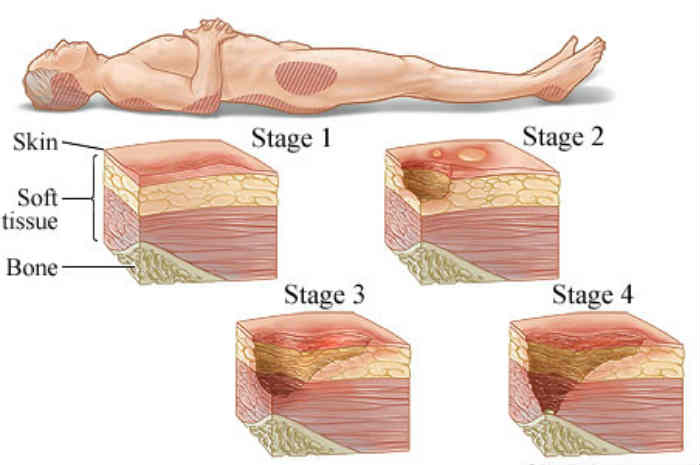Of the many injuries caused by
patient neglect, decubitus ulcers (commonly known as pressure sores and
bedsores) are one of most unnecessary. While decubitus ulcers can cause devastating,
life-altering injuries, they can often be prevented by caretakers with
relatively minor effort.
In this article, we will
discuss the role of medical malpractice
in causing decubitus ulcers and the significant
risks they pose to victims.
At the Law
Office of Alvin F. de Levie, Esq., we have represented individuals and
families in cases involving decubitus ulcers for decades throughout the
Commonwealth of Pennsylvania, including, for example, Montgomery County, Philadelphia
County, Centre County, Bucks County, Chester County, Delaware County, Lehigh
County, Clearfield County, and Fayette County, to name a few. In fact, we are
presently handling cases involving decubitus ulcers in a long-term care
facility and a hospital. Our team of lawyers has the expertise, the resources,
and the experts necessary to take these cases to trial.
What are Decubitus Ulcers?
As described by the Mayo Clinic
decubitus ulcers are caused by external pressure on the
skin. This pressure often comes from
lying or sitting in the same position for too long because hospital or nursing
home staff does not properly observe and move the patient from one position to
another. The pressure compresses the blood vessels in
the skin, depriving the skin of oxygen and nutrients. Over time, this leads to the swelling and
eventual death of the underlying tissue.
Initially, the ulcer may
present as a large, red, warm, painful bump on the skin (a Stage I decubitus ulcer). If left untreated, the victim will begin to
lose skin in and around the sore as the underlying tissue begins to die (A
Stage II decubitus ulcer). Advanced decubitus
ulcers (Stages III and IV) can spread far into the underlying tissue,
destroying muscle and bone, and posing a risk of serious infection. Victims of advanced decubitus ulcers are at
risk of suffering permanent damage to their nerves and bones, which may result
in paralysis or even death.
Those most at risk of
developing decubitus ulcers are confined to hospital beds, nursing homes,
wheelchairs and others who require assistance to move around. According to a CDC Data Brief
from 2009, 11% of nursing home residents suffered from decubitus ulcers. Decubitus ulcers can develop in
any confined setting, however, whether a hospital, nursing home, hospice, or
even at home.
How Can Pressure Sores Be Prevented?
The simplest way to prevent decubitus ulcers is to simply
redistribute the pressure by regularly moving the individual to a different
position. This may involve moving a patient
from their back to their side or having a patient who has been sitting too long
lie down. In a hospital, nursing home,
and other such settings, policies, including proper “turn schedules,” should be
in place to require immobilized patients to be moved at regular intervals. The
medical records kept by the nursing home or hospital should reflect how
faithfully the medical providers adhered to the “turn schedule,” showing how
often the patient was rotated or otherwise moved.
Caregivers and family members of patients at risk for
decubitus ulcers should routinely check from head to toe for signs of new decubitus
ulcers. Catching a decubitus ulcer early
can mean the difference between an easy recovery and a lifetime of pain and
disability. Family members visiting
loved ones confined to nursing homes or hospitals should ask medical personnel
about when and how frequently their loved ones are being rotated and otherwise
moved to prevent decubitus ulcers. Loved ones should also ask what kind of
monitoring and treatment is provided to ensure that decubitus ulcers are
addressed when and if they do appear.
Decubitus ulcers often occur when medical personnel and
staff fail to properly monitor patients who cannot move around on their own. Failing
to notice a decubitus ulcer in its early stages, when simple treatments can
address the ulcer, can lead to the development of a more invasive and more
deadly ulcer. Medical records kept by
nursing homes and hospitals should reflect when a decubitus ulcer is discovered
and should record regular observations of the nature and extent of the ulcer,
as well as it’s growth and progression.
At the Law Offices of Alvin F. de Levie, our team of
attorneys has decades of experience in reviewing medical records, and we know
what to look for to determine whether your loved one’s medical providers were
negligent in causing or treating a decubitus ulcer.
What
Should YOU Do If You, A Loved One Or A Friend
Suffers Injuries Caused by Decubitus Ulcers?
YOU SHOULD CONTACT MY OFFICE
IMMEDIATELY.
Like all medical malpractice
cases, cases involving decubitus ulcers are incredibly complex and require an
extraordinary amount of investigation. Your attorney may need to obtain and
review thousands of pages of medical records, which will then need to be reviewed
by an expert. This is an expensive and
time-consuming process that must begin as soon as possible to determine whether
you have a claim. You also need an attorney with a thorough knowledge of the
practice of medicine and the resources necessary to take the case to trial, if
necessary.
At the Law Office of
Alvin F. de Levie, Esq., our team of attorneys has decades of experience
representing individuals and families injured due decubitus ulcers. We have handled medical
malpractice cases throughout Pennsylvania: From Philadelphia and the
surrounding counties to Centre County, from Central Pennsylvania to Pittsburgh,
and from the New York border to the borders of West Virginia and Maryland. If you have suffered an injury or someone
died as a result of decubitus ulcers, please call our firm – 24 hours a day, 7
days a week – at (215) 696-3900 for a consultation. One of our team members will be in immediate
contact with you. We maintain offices
throughout Pennsylvania in Philadelphia, State College and Bellefonte. We are
willing to meet any clients throughout the Commonwealth.






























